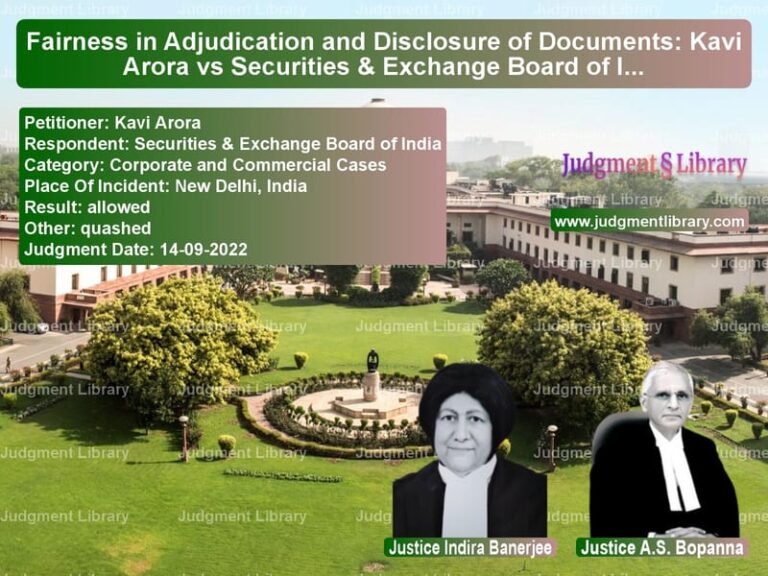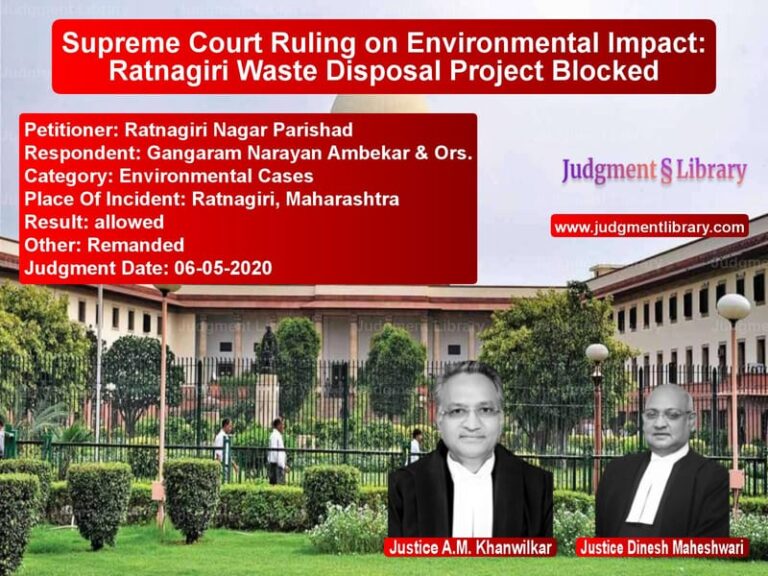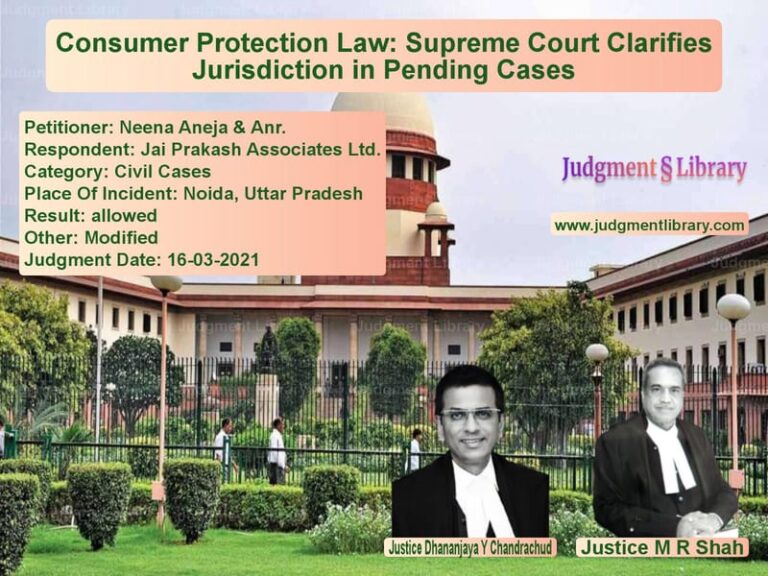Legal Analysis on the Quashing of Criminal Proceedings in Attempt to Murder Cases
The case of State of Madhya Pradesh vs. Kalyan Singh & Ors. is a crucial judgment that deals with the quashing of criminal proceedings in non-compoundable offences such as those under Section 307 IPC (Attempt to Murder). The Supreme Court, in this case, examined the conditions under which a High Court can quash a criminal case under Section 482 CrPC and whether a compromise between the accused and the victim can be the basis for such quashing.
This case sheds light on the judicial approach to handling serious offences that affect public interest. The ruling emphasized that while settlements may be considered for minor, compoundable offences, non-compoundable offences require strict legal scrutiny to ensure that justice is served.
Background of the Case
The case arose from an FIR registered against Kalyan Singh and others under Sections 307 (Attempt to Murder), 294 (Obscene Acts and Songs), and 34 (Acts done by several persons in furtherance of common intention) of the Indian Penal Code. The prosecution alleged that the accused had fired gunshots at the complainant, causing life-threatening injuries. Despite the gravity of the allegations, the accused moved the High Court under Section 482 CrPC, seeking the quashing of the case on the ground that a compromise had been reached between them and the complainant.
The High Court, considering the compromise, allowed the petition and quashed the criminal proceedings. The State of Madhya Pradesh, aggrieved by this decision, filed an appeal before the Supreme Court.
Legal Issues
- Can a criminal case under Section 307 IPC be quashed solely on the basis of a settlement between the accused and the victim?
- What is the role of High Courts in exercising their inherent powers under Section 482 CrPC?
- Does quashing a serious offence like attempt to murder set a dangerous precedent?
Arguments Presented
Petitioner (State of Madhya Pradesh)
- The prosecution argued that Section 307 IPC is a serious offence involving an attempt on a person’s life and, therefore, should not be subject to compromise.
- The State contended that the High Court had erred in quashing the case, as doing so undermines the purpose of criminal law.
- Allowing the quashing of cases involving heinous offences may set a precedent where influential accused persons could manipulate victims into a settlement.
Respondents (Kalyan Singh & Ors.)
- The accused contended that they had reached an amicable settlement with the complainant and that the latter had no further grievance against them.
- They argued that the compromise had been recorded voluntarily and that allowing the case to continue would be an unnecessary burden on the legal system.
- The respondents claimed that they had no prior criminal records and that continuing prosecution would cause undue hardship.
Key Observations of the Supreme Court
“In cases involving serious crimes, the interest of society must override private settlements between parties. The power of quashing should be exercised cautiously to prevent the miscarriage of justice.”
- The Court emphasized that offences like attempt to murder are not just against an individual but against society at large.
- The power under Section 482 CrPC is to be used sparingly, especially in cases involving serious offences.
- The nature and gravity of the offence must be considered before granting any relief based on a settlement.
- Compromises may be relevant in minor offences, but they cannot be the sole ground for quashing in serious criminal cases.
Supreme Court’s Judgment
The Supreme Court set aside the High Court’s order and reinstated the criminal proceedings against the accused. The judgment laid down important principles regarding the exercise of power under Section 482 CrPC:
- Courts must exercise caution in quashing cases involving non-compoundable offences.
- Public interest and legal precedents should be the guiding factors in such decisions.
- The accused must stand trial and prove their innocence before the competent court.
Implications of the Judgment
The ruling clarifies the legal stance on quashing non-compoundable criminal cases and ensures that serious offences do not go unpunished. This decision is crucial for preventing misuse of compromise as a tool to evade criminal liability.
Conclusion
The Supreme Court’s decision in this case reinforces the principle that crimes affecting public order and safety must be prosecuted to their logical conclusion. The judgment establishes that while settlements are relevant in some cases, they cannot override statutory provisions regarding non-compoundable offences.
Petitioner Name: State of Madhya Pradesh.Respondent Name: Kalyan Singh & Ors..Judgment By: Justice D. Y. Chandrachud, Justice M. R. Shah.Place Of Incident: Gwalior, Madhya Pradesh.Judgment Date: 04-01-2019.
Don’t miss out on the full details! Download the complete judgment in PDF format below and gain valuable insights instantly!
Download Judgment: State of Madhya Prad vs Kalyan Singh & Ors. Supreme Court of India Judgment Dated 04-01-2019.pdf
Direct Downlaod Judgment: Direct downlaod this Judgment
See all petitions in Attempt to Murder Cases
See all petitions in Bail and Anticipatory Bail
See all petitions in Custodial Deaths and Police Misconduct
See all petitions in Judgment by Dhananjaya Y Chandrachud
See all petitions in Judgment by Mukeshkumar Rasikbhai Shah
See all petitions in allowed
See all petitions in Quashed
See all petitions in supreme court of India judgments January 2019
See all petitions in 2019 judgments
See all posts in Criminal Cases Category
See all allowed petitions in Criminal Cases Category
See all Dismissed petitions in Criminal Cases Category
See all partially allowed petitions in Criminal Cases Category







